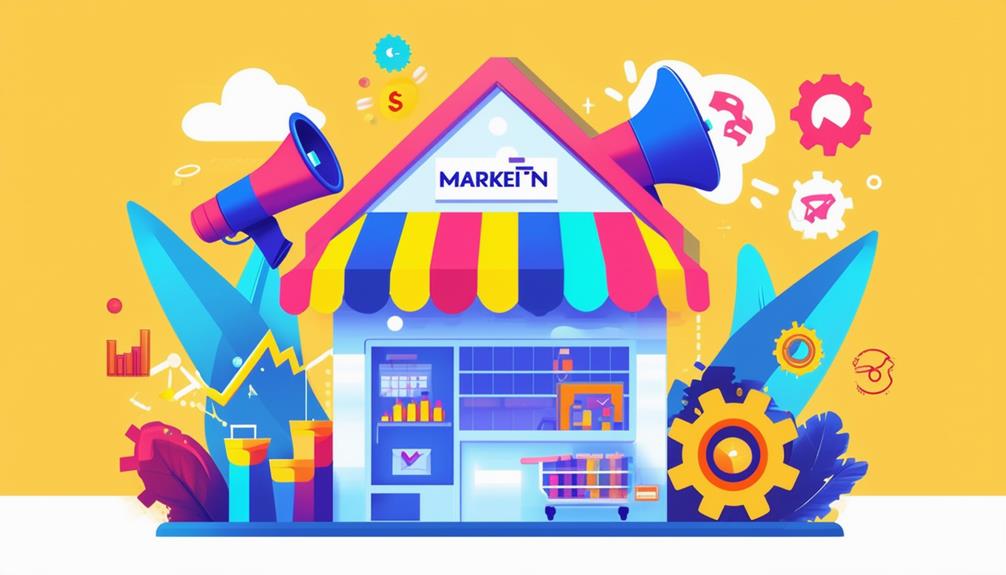
You're looking to turbocharge your small business with the most effective marketing tools. You're on the right track! To boost brand awareness and drive sales, you'll need a combination of powerful tools. Start with email marketing automation using Mailchimp or Constant Contact to target specific audiences. Leverage SEO and analytics essentials like KWFinder and Google Analytics to optimize your website and track performance. Don't forget about social media management tools like Hootsuite and Canva to create engaging content. Now, take the next step and explore more tools and strategies to supercharge your marketing efforts.
Top Marketing Tools for SMBs
As a small business owner, you're likely no stranger to the challenge of maximizing your marketing efforts on a limited budget, but with the right tools, you can level the playing field and reach your target audience more effectively. By leveraging top marketing tools, you can streamline your marketing strategy and get ahead of the competition.
For instance, Mailchimp's free service allows you to manage up to 2,000 subscribers, providing valuable segmentation, personalization, and CRM tools.
Hootsuite's advanced reporting and brand mention tracking capabilities help you schedule posts across multiple channels and measure campaign effectiveness.
Meanwhile, BuzzSumo's content research tool helps generate content ideas by analyzing trending topics, making it easier to create engaging content that resonates with your audience.
To further amplify your marketing efforts, consider influencer partnerships and local advertising strategies. By partnering with influencers who align with your brand values, you can tap into their existing audience and increase brand awareness.
Similarly, local advertising strategies can help you target customers in your area, driving foot traffic and sales. With the right tools and strategies in place, you can take your marketing to the next level and achieve real results.
SEO and Analytics Essentials
By mastering SEO and analytics essentials, you can pinpoint areas of improvement, refine your marketing strategy, and make data-driven decisions that drive real results.
With tools like KWFinder, you can optimize your website for relevant keywords, increasing organic traffic and conversion rates.
Google Analytics provides important insights into your website's performance, allowing you to track conversion rates, identify top-performing pages, and refine your marketing strategy.
By setting up conversion tracking, you can measure the effectiveness of your marketing campaigns and identify areas for improvement.
Additionally, analytics tools help you understand your target audience, their demographics, and behavior, enabling you to create targeted content that resonates with them.
By leveraging these insights, you can refine your marketing strategy, increase engagement, and drive more sales.
Automating Email Marketing Efforts
With email marketing automation tools, you can streamline your campaigns, boost efficiency, and drive more sales by targeting specific audiences with personalized content. By leveraging email segmentation and personalization features, you can create tailored messages that resonate with your audience, increasing engagement and conversion rates.
| Tool | Features | Benefits |
|---|---|---|
| Mailchimp | Free service for up to 2,000 subscribers | Cost-effective for small businesses |
| Constant Contact | Segmentation and personalization | Target specific audiences effectively |
| ActiveCampaign | Lead management and automation | Nurture leads and increase conversion rates |
| Campaign Monitor | Advanced features and conversion tracking | Enhance email marketing campaign performance |
CRM and Project Management Tools
You can take your email marketing efforts to the next level by integrating customer relationship management (CRM) tools and project management systems that help you streamline operations and improve customer interactions. By leveraging CRM tools like HubSpot and Salesforce, you can better manage customer interactions, enhance customer segmentation, and improve retention rates.
- Imagine having a 360-degree view of your customers' interactions, allowing you to tailor your marketing strategies to their specific needs.
- Picture a dashboard that provides data visualization of your sales pipeline, enabling you to identify areas for improvement and optimize your sales strategy.
- Envision a project management system that automates task scheduling, customizable workflows, and dashboard management, freeing up more time for strategy and growth.
Social Media and Content Creation
Effective social media management and content creation are essential components of a successful marketing strategy, as they enable small businesses to build a strong online presence, engage with customers, and drive conversions.
You can create visually appealing content using graphic design tools like Canva, which offers templates for social media posts, infographics, and presentations. This helps you establish a consistent brand identity across platforms.
For social scheduling, tools like Buffer and Hootsuite allow you to plan and schedule posts in advance across multiple channels, saving you time and increasing efficiency. You can analyze performance, track engagement, and refine your strategy with their advanced reporting features.
Additionally, BuzzSumo helps you generate ideas for writing by analyzing trending content, ensuring your content resonates with your audience. By leveraging these tools, you'll be able to create and distribute content that resonates with your target audience, driving engagement and conversions for your small business.
Measuring Marketing Success Factors
By tracking key performance indicators such as email open rates, social media engagement, and conversion rates, you can accurately measure the success of your marketing campaigns and identify areas for improvement. This data-driven approach helps you understand your audience's behavior, preferences, and pain points, enabling you to refine your marketing strategy and optimize your resources.
To get a holistic view of your marketing performance, consider the following metrics:
- Conversion rates: Track the number of leads generated, sales made, or desired actions taken as a result of your marketing efforts.
- Engagement metrics: Monitor likes, shares, comments, and other social media interactions to gauge audience interest and responsiveness.
- Audience segmentation: Analyze demographic, behavioral, and firmographic data to identify high-value customer segments and tailor your marketing approach accordingly.
Choosing the Right Marketing Tools
Selecting the right marketing tools is essential to amplifying your online presence, driving sales, and staying ahead of the competition, as the wrong choice can lead to wasted resources and stagnated growth.
When choosing marketing tools, take into account your specific needs, such as email marketing automation, social media management, and SEO optimization. Evaluate the features and pricing of different tools to make sure they align with your budget and goals for growth. Look for user-friendly tools that can streamline your marketing efforts, such as content creation platforms, CRM systems, and analytics software.
As you weigh your options, keep budget considerations top of mind. You want to make sure you're investing in tools that will yield a strong return, not drain your resources. It's also important to take into account your target audience insights. What platforms do they frequent? What type of content resonates with them? By understanding your audience, you can choose tools that help you effectively reach and engage with them.
Frequently Asked Questions
What Is the Most Successful Marketing Tool for Small Businesses?
You're likely wondering what's the most successful marketing tool for small businesses like yours. While many swear by email marketing's impressive ROI, marketing automation and social proof are game-changers, boosting conversions and credibility.
What Type of Marketing Is Best for Small Business?
When deciding what type of marketing is best for your small business, focus on niche targeting to reach your ideal audience, and allocate your budget wisely to maximize ROI, ensuring you're getting the most bang for your buck.
What Is the Most Powerful Tool in Marketing?
You're likely wondering what the most powerful tool in marketing is, and the answer is data-driven insights, fueled by Artificial Intelligence and Data Analytics, empowering you to make informed decisions and stay ahead of the competition.
What Are the Top 5 Marketing Mistakes Small Businesses Make?
You're likely making one of the top 5 marketing mistakes: lack of planning, unrealistic expectations, neglecting data tracking, failing to differentiate, or ignoring social media and SEO opportunities, hindering your small business's growth and visibility.
Conclusion
Now that you've explored the most successful marketing tools for small businesses, it's time to put them into action!
By leveraging SEO and analytics essentials, automating email marketing efforts, utilizing CRM and project management tools, and mastering social media and content creation, you'll be well on your way to driving growth and revenue.
Remember to measure your marketing success factors and choose the right tools for your business – the key to unleashing your full potential.
- How to Track and Improve Website Conversion Rates - 14/01/2026
- Best Practices for Call-to-Action Buttons - 09/01/2026
- The Psychology of Colours in Web Design - 04/01/2026


